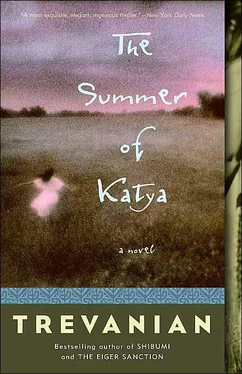Rodney Whitaker - The Summer of Katya
Здесь есть возможность читать онлайн «Rodney Whitaker - The Summer of Katya» весь текст электронной книги совершенно бесплатно (целиком полную версию без сокращений). В некоторых случаях можно слушать аудио, скачать через торрент в формате fb2 и присутствует краткое содержание. Город: New York, ISBN: , Издательство: Crown Publishing Group, Жанр: Триллер, Современные любовные романы, на английском языке. Описание произведения, (предисловие) а так же отзывы посетителей доступны на портале библиотеки ЛибКат.
- Название:The Summer of Katya
- Автор:
- Издательство:Crown Publishing Group
- Жанр:
- Год:неизвестен
- Город:New York
- ISBN:1400098041
- Рейтинг книги:4 / 5. Голосов: 1
-
Избранное:Добавить в избранное
- Отзывы:
-
Ваша оценка:
- 80
- 1
- 2
- 3
- 4
- 5
The Summer of Katya: краткое содержание, описание и аннотация
Предлагаем к чтению аннотацию, описание, краткое содержание или предисловие (зависит от того, что написал сам автор книги «The Summer of Katya»). Если вы не нашли необходимую информацию о книге — напишите в комментариях, мы постараемся отыскать её.
The Summer of Katya — читать онлайн бесплатно полную книгу (весь текст) целиком
Ниже представлен текст книги, разбитый по страницам. Система сохранения места последней прочитанной страницы, позволяет с удобством читать онлайн бесплатно книгу «The Summer of Katya», без необходимости каждый раз заново искать на чём Вы остановились. Поставьте закладку, и сможете в любой момент перейти на страницу, на которой закончили чтение.
Интервал:
Закладка:
“I never saw it before,” Katya said. “But I’m sure I can do it.” She rehearsed the simple steps in place, making a demure little jump at the appropriate beat. “Yes, I can do it. Come.”
“No. Wait a minute. We’ll join in later.” I didn’t bother to explain the complexities of good form that regarded the first girls to enter the dance as a bit brazen and forward, to avoid which stigma they held back, coy and complaining, and had to be dragged out by their young men or pushed forward by giggling girl friends, their cheeks flushed with mock shame and real pleasure. It would certainly not have done for a non-Basque woman in a rather formal white dress to be one of the first dancers.
As I glanced over the crowd, my eye fell on the five young Parisians who had nearly run us down in their motorcar. They stood directly across the ring from us, the young women watching the first dancers with interest, but the languid attitudes of the two young men proclaiming their disdain for this rustic merrymaking.
For fully half of the first dance, there were fewer than ten couples in the ring, most of them newly married or soon-to-be-married, for this status freed the women from any implications of being brazen or showing off. Then a middle-aged farmer a bit bent with wine pushed his chubby wife out into the ring to the cheers and hoots of their friends, and he began to dance around her while she hid her face in her hands. When she gave up her show of coy embarrassment and began to dance with a will, the signal was received by all the girls that they might dance without damage to reputation, and instantly the square was alive with shouting, laughing dancers who peeled forward from the ring of onlookers, making that ring larger by their departure from it. It was then that I pressed Katya forward and we danced, unnoticed in the throng.
The trio of the band ended its first melody and immediately entered upon the next, so as to catch the dancers before they could return to the circle of bystanders. Couples linked up into lines of four or six, then the segments combined and lengthened until the dancers were formed in two long irregular queues facing one another. Two skip steps forward, two back, then a leap as high as one could, the women landing with shrieks and a billow of skirts. I was surprised at how easily the forgotten dance came back to me. Perhaps it is true that the impulse to dance—particularly the vigorous sauts basques—is a genetic trait of the Basque male. The man who shared Katya’s waist with me was a strong shepherd who could leap as high as his belt, and the woman around whom I had my other arm was a plump girl of ruddy complexion and surprising agility. Soon the center of our line was jumping notably higher than the ends and even higher than the people immediately in front of us, so we chided them about their lack of strength and will. With grins and nods, the men opposite accepted our challenge and began to carry their complaining partners higher and higher in the leap, and the joyous shrieks of the women took on a note of real fear lest they fall to the stones of the square.
Catching the mood of the challenge, the band began to play faster and faster, and the leader laughed and called out for us to give it our all. Older and less athletic people dropped away, panting and shaking their heads, and soon each of the lines contained no more than a dozen couples, with Katya and I in the center of our team. We panted and our legs trembled, but each line was determined not to give in before the other. The tempo increased. I was badly out of condition and was on the verge of dropping out when both lines simultaneously began to cry out to the band Naikua! Naikua! (That’s enough!). With a final taunt, the band played a last verse at an impossibly fast tempo, and the dance ended with all the participants stumbling, their rhythm shattered, in a panting jumble.
There was laughter and shouts, and men clapping one another on the back, and the strong young shepherd who had shared Katya with me gave her a vigorous hug and complimented her endurance and strength in the reluctant way of the Basque… not all that bad for an outlander!
Gasping for breath, my lungs aching, I led Katya through the circle of onlookers to a quieter part of the square near the buildings and out of the light of the paper lanterns. My legs were so wobbly that I had to lean against the stone faзade to regain my strength.
“Wonderful!” she said, her face aglow with the excitement and joy of the dance.
“Yes…” I tried to catch my breath and swallow through a parched throat. “…Wonderful. But I should warn you that… I may die of a heart attack any second now.”
“Oh, rubbish!” She touched my moist forehead with her handkerchief. “It is true that the men do most of the work. But that’s as it should be.”
I nodded, unable to speak. When the pulse stopped throbbing in my temples I asked her if she would like something to drink.
“No, thank you,” she said offhandedly; then she recognized my worn and parched condition and amended, “Yes, that would be nice. Thank you.”
Just at that moment, there was a clatter of the stick drum and a twittering shriek of the txitsu flute. The throng hushed and everyone in the square and at the buvettes froze in place and turned towards a narrow alleyway across the way.
“What is it?” Katya asked in a whisper.
“The Drowned Virgin. Watch.”
A firework tube was struck near the mouth of the alleyway, and its flaring, sputtering light turned the walls of the buildings a vivid red. Then the stick drum took up a funereal beat to the tempo of which a line of costumed mourners emerged from the gap between buildings and began their slow march across the square, the crowd soberly parting to make way for them. First came two children robed all in white, their faces covered with a chalky masklike makeup, their eyes and mouths accented in black. Behind them strode a richly costumed man (presumably the brother of the accused woman) dragging heavy penitential chains that clattered over the cobbles. Next came two young men dressed in rags and patches, each carrying a heavy stone with a hole bored through it, and through the holes were passed knotted ropes like those used to weigh the accused woman down when she was thrown into the river. Finally came the Virgin, a girl of fifteen or so, chosen for beauty from among the girls of the district, borne on the shoulders of six young men, three to the right, three to the left, walking in exact chain step. She lay stiff on their shoulders, her head thrown back and her hair falling to the waist of the lead bearer. Her white dress of gossamer material had been soaked in water, and it clung most revealingly to her plump body, her nipples dark beneath the fabric. Her long hair had been drenched with oil and combed out in a stiff, inhuman way, and drops of the oil dripped on the cobbles.
The swaying line of mourners passed very close to us, and at the sight of the Drowned Virgin, Katya grasped my arm, her fingers digging into it. I felt her tremble.
As the mourners approached the narrow alleyway directly opposite the one from which they had emerged, another red firework tube was struck, and they disappeared into a hell like the one from which they had materialized. For a prolonged moment, there was absolute silence.
Then the men of the crowd broke into shrieks of the long, yapping cri basque that could chill the blood of those not used to it.
Instantly, the band struck up another Kax Karot tune, and the dancing, the laughter, the drinking was all about us.
“What does it mean?” Katya asked in a subdued voice.
“Oh, nothing. Nothing at all. It’s just an ancient ritual. Shall I get us something to drink?”
“No, don’t leave!” She held my arm tighter. Then, in a calmer voice, “Let’s dance. I want to dance.”
Читать дальшеИнтервал:
Закладка:
Похожие книги на «The Summer of Katya»
Представляем Вашему вниманию похожие книги на «The Summer of Katya» списком для выбора. Мы отобрали схожую по названию и смыслу литературу в надежде предоставить читателям больше вариантов отыскать новые, интересные, ещё непрочитанные произведения.
Обсуждение, отзывы о книге «The Summer of Katya» и просто собственные мнения читателей. Оставьте ваши комментарии, напишите, что Вы думаете о произведении, его смысле или главных героях. Укажите что конкретно понравилось, а что нет, и почему Вы так считаете.












